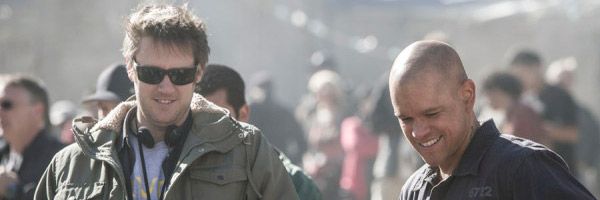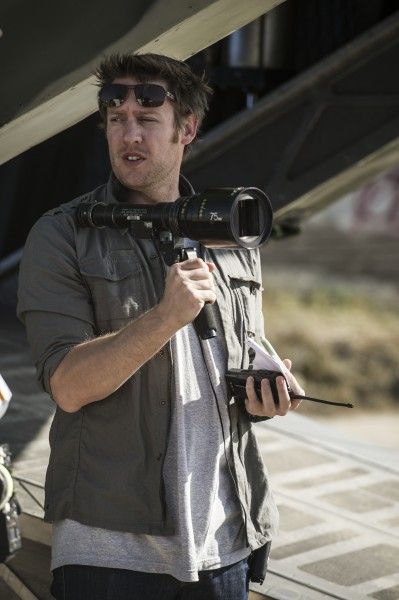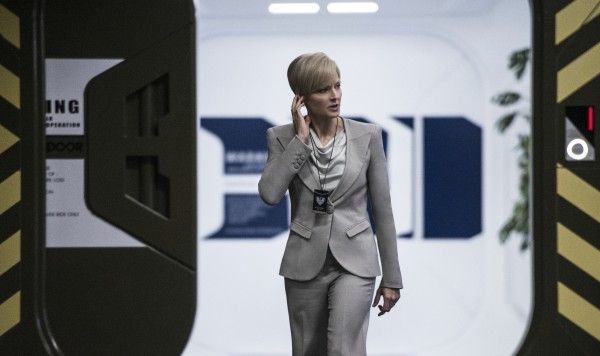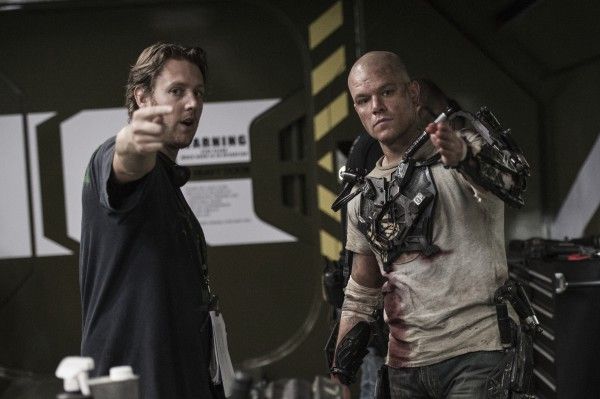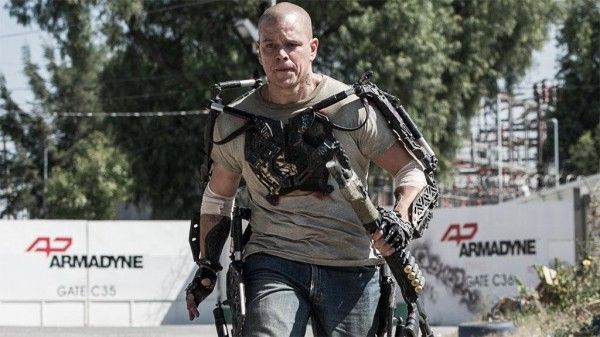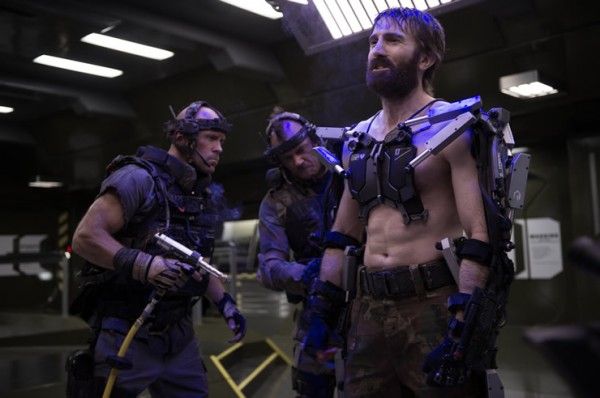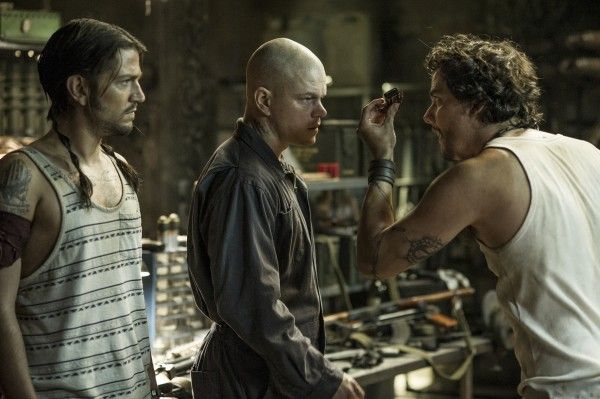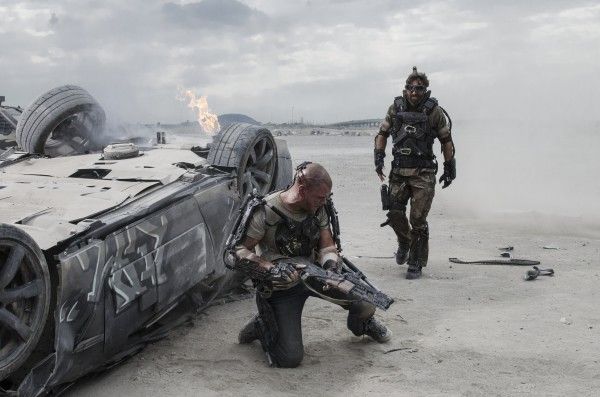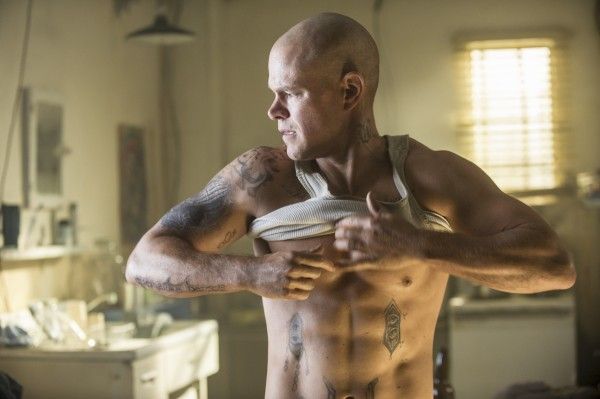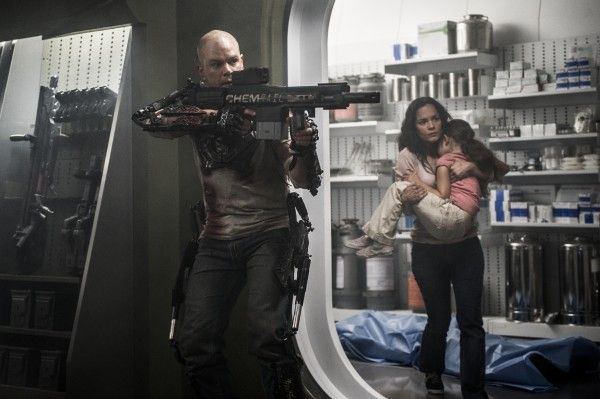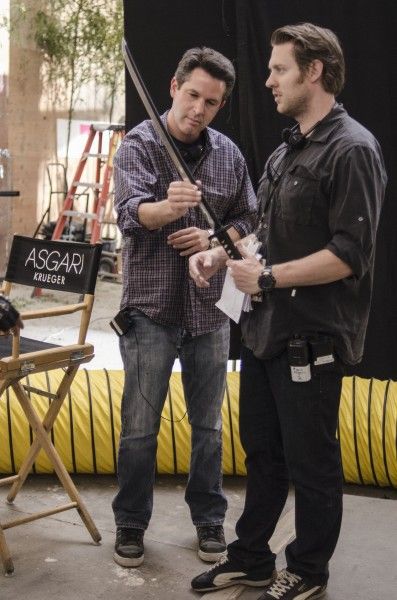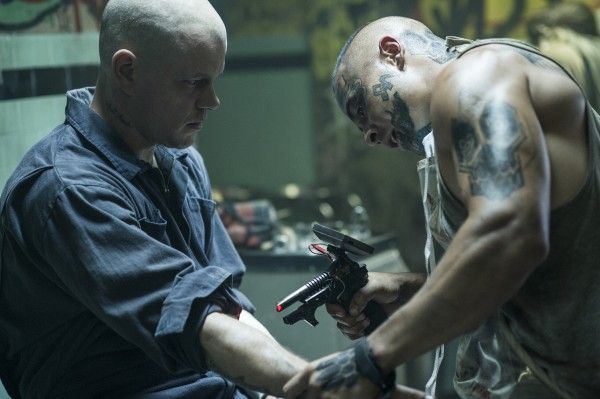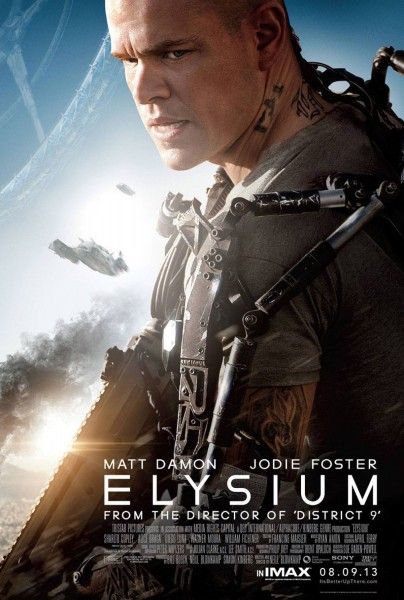Opening this weekend is director Neill Blomkamp’s Elysium. For those unfamiliar, the story takes place in 2159, and two classes of people are divided: the wealthy live on a man-made space station called Elysium, while the rest of the humans inhabit an overpopulated and ruined Earth. Matt Damon plays a desperate man who must reach Elysium in order to find a cure that will save his life. The film also stars Jodie Foster, Sharlto Copley, Alice Braga, Wagner Moura, Diego Luna and William Fichtner.
The other day I was able to participate in a very small group interview with Blomkamp. He talked about creating a realistic version of the future, where the project came from, working with big stars, how the version of Elysium that would've starred Eminem was a lot different, the prospect of directing a franchise film, what happened with Halo, his thoughts on Kickstarter, Chappie, the film after Chappie, his thoughts on using IMAX cameras, and a lot more. Hit the jump to either read or listen to what he had to say.
Click here for the audio of this interview. Otherwise the full transcript is below.
Question: How long has this idea been percolating in your head after District 9? Was this something you wanted to do for a while?
NEILL BLOMKAMP: Yeah, it’s like these organic things that just sort of- you never really know when they begin or end to a certain degree. I got arrested in Tijuana.
Who hasn’t?
BLOMKAMP: But no, it wasn’t really fair because I hadn’t done anything. I got shaken down would be a better description, I think. I ended up walking weirdly quite close to the U.S. border at night with Black Hawks flying up and down because of the naval base. And that was when I was twenty-five, so that was beforeDistrict 9. I always thought that that image and that concept, that an hour before I was on the other side of the fence, stuck with me so much that I thought someday that would turn into something. Essentially Elysium really is that.
What’s it like going from struggling to make a movie to all of a sudden being able to have the budget to basically do a shot, or to set up the camera, or do what you want with basically some freedom?
BLOMKAMP: You know what’s interesting is I actually feel I’m at that point now after Elysium. I never actually felt that on Elysium. I feel like it’s been such a fight to get to where I am at now that for the first time I feel like, going forward now, I can actually now try to become a better filmmaker. I don’t know if that makes sense, but everything that I’ve done so far it’s like you’re trying to keep your head above water. There’s political stuff happening and there’s so many things happening, but you’re learning which crew members you want to work with, which ones stab you in the back, who changes, which positions work, which ones don’t work. Now for the first time I feel like it’s a flat plateau now and if I want to I can actually become a better filmmaker. Now I can actually get the noise away, like out of my head, from other people, and hone the craft of filmmaking. Hopefully ten years of twenty years from now if I don’t die from Legionnaires' disease, which I thought I had on Monday, I will be a better filmmaker.
But to the point, District 9 starred your buddy Sharlto and then after District 9 you were able to get Matt Damon, Jodie Foster, it must have changed something for you.
BLOMKAMP: It definitely did. I love the financier of this film, Modi Wiczyk from MRC, and I wrote to him when we were shooting the film, like half way through it, and basically I was saying “thank you for allowing me to be an artist that can stand in a garbage dump in Mexico city shooting exactly what I want to shoot.” So yes, you’re right. But the difference is, even though you have political ability to shoot what you want, and the film is what I want, you’re still outside the realm of the film. There’s this static noise of politics and you’re learning as you go. Here’s another way of thinking of it. Ridley Scott on his like 780th film now just like arrives at set- it’s like a machine, it’s like a well-oiled machine with crew members who just know him and know what he wants and everything just goes smoothly and he leaves. I want to get closer to where it’s just pure artwork and there isn’t any other extraneous force in there that’s making you not focus 100%.
How do you feel about working with the lesser known actors versus working with Matt Damon and Jodie Foster? How do you feel that affects that journey towards becoming that well-oiled machine?
BLOMKAMP: The actors fit into that very smoothly, actually. It’s more setting up the way that the structure of the film happens. The actors are the good part. I do feel like I was very lucky on Elysium. A big part of it was meeting the actors and making sure that I felt like they were people that are like me. I don’t really want to just go to parties and hang out at red carpets and stuff. It’s about the film, and they all felt that way when I met them. So I feel I kind of lucked out because it was a group of people that wanted to do the same thing that were just professionals and we just make film. I think if you can continue to do that as a filmmaker, then you’re in a good place. Every once in a while you can have someone who kind of just fucks the entire process up.
There were stories Eminem had originally been considered for this. I would never think of Matt Damon in the same light as him. How did you think they both fit? How did you make that transition?
BLOMKAMP: Well the fact that that came out was slightly erroneous, only in the sense that the version of Elysium that I wanted Eminem for was not this film. It was a very different version. When I came up with the idea after District 9 I was very much in the sociological mindset of just this entire Tijuana border-fence kind of thing. And growing up in South Africa I was just interested in it and I knew that I wanted to make a science fiction film about the haves and the have-nots. And the original script that I had was purposefully much lower budget. And the set up was completely different. There was no space habitat. The way that the rich lived was this very cool idea that I, one day, want to turn into something else, because I like it so much, but it was totally different to this film. In that low budget edgier, stranger film, in that context I wanted an unusual star. That’s when he was approached. But then what happened was the concept that I’m talking about that I liked, it never felt right for the story. It wasn’t really designed for a haves, have-nots kind of story. It kept not feeling right so I shelved that, and then I came up with the idea of a physical ring that you go to and is lined with Beverly Hills mansions. And the second that happened I just jacked the budget up by 60 million dollars. That changed the whole way I thought of it. And then I was still apprehensive to use stars, but I thought if it cost more to get the ring made, it costs more anyway, why not try to make it more of like a cinematic experience rather than some under the radar kind of film. And so my whole thinking kind of changed and then I went through a list of people and Matt was- I mean Matt really was the only guy on this list. Because a lot of other people come with…I’m just fearful of them messing with the script or doing something and Damon has such a good reputation that way. So that’s the story.
So you wouldn’t cast Edward Norton?
BLOMKAMP: No. I’m pretty sure that- yeah.
In addition to being actors Matt and Jodie are both filmmakers in their own right. Did that make a difference for as far as them understanding your vision and not wanting to mess with it?
BLOMKAMP: Yeah, totally. It’s not even so much understanding the vision, it’s even beyond that. It’s just the way you work on set. If someone understands that they’re a cog of a very big machine, and they are filmmakers. Matt hasn’t directed something yet, but he keeps almost directing something, and he knows exactly what it takes, and he’s interested in it. When that is your understanding- the way he described it to me was “You’re helping the director create this magic trick where you’re basically fooling the audience for two hours into believing ‘x’, and having an asset in someone who’s trying to help you create that illusion means they’ll do whatever they need to to help you create the illusion.” Another way of looking at it is “Where’s my close-up you know? My makeup doesn’t look good.” And it’s like that’s a problem. That’s something else. It goes slightly beyond just…they could still be worried about their makeup and want to help your vision. See what I mean? But if they really understand filmmaking, they know it’s about getting the shot before the sun goes down, and you don’t have time to get your hair done.
Here’s my challenge though, and I’m interested in you talking about a stranger or another version of Elysium. I loved District 9 and I came to this with interest in something raw and edgy, and I have to be honest, so much of the stuff I felt like I could predict from start to finish. It was beautiful to watch and I loved the social justice parts of it. But I’m interested in if you’ve now arrived to the Elysium of Hollywood film scene, why not take that hundred million bucks and do something really edgy and interesting because you’ve got the chops and the credibility to do it?
BLOMKAMP: It depends on the kind of film you want to make. Elysium really is the film I wanted to make. Again, if I don’t die of Legionnaires’ disease, looking back on it like five films down the line it may be the most expensive film and it will be something I will eternally be proud of. So it was the film I wanted to make. But answering your question, the next film I want to make is far lower budget than this and is fucking mental. And the film after that is…I think it may end my career. It’s a comedy and I don’t know what will happen and I like that I don’t know what will happen. If it’s too volatile and people just hate it and I get booted out of Hollywood I can go back painting paintings and stuff. To have a bunch of lower budget, very interesting, super edgy films and not have something cinematic- my whole goal with this was cinema, big scale cinema and archetypal storytelling and archetypal lead character. I would not be happy to be a guy that didn’t have that in my body of work. So that’s really the thinking.
Can you talk about, you brought up the socioeconomic issues, and one thing in this race relations that you see in this film as well, and I know you mentioned Tijuana, but could you talk about how you divided the races? I know I saw one black guy in the L.A. kind of pit and then…
BLOMKAMP: In future L.A.?
Yeah and at the end I saw it looked like Africa was charging towards…How did you go about deciding what you show? Also, the people on Elysium seem to speak largely French and English and I’d like to know how you got to that as well.
BLOMKAMP: This is basically the idea. There’s two things. The one is metaphor and trying to stick to metaphor. When you’re talking about metaphor right now, I specifically didn’t want to include China because it just complicates things, but right now wealth is contained in North America and Europe. So they’re either going to be speaking English or European languages. And it happened to be French because Jodie is fluent in French. So you would presumably have many other languages happening on the station within European languages, to hold true to the metaphor. That’s the metaphor part of it. The other metaphor part, actually, it’s like me being in Tijuana, it’s like wanting to flip the point of view for Americans where this is what it feels like to be on the other side of the fence looking over the fence. In this case it’s looking up at Elysium. But it’s kind of flipping America into a dilapidated, broken, more economically depressed America. So I wanted those two things, the languages on the station and the metaphor of America being broken. And the third thing is painting this realistic image of a future Earth that is my realistic version of a future Earth. Which meant the borders being erased entirely and having this fluid population group that basically moves from Chili all the way up to Canada. It just flows, because it can. It’s kind of like the EU, like the EU on steroids. I just wanted that to feel real like as real as possible.
The numbers of people that are Latin are going to overwhelm the numbers of people that aren’t. And if you hold true to the metaphor, the wealth would have gone to the station. The only thing that didn’t stick true to the metaphor or the realism part was that in Mexico City I couldn’t get enough black actors. I tried as hard as I could and the only black actor that I could find in Mexico City was the kid at the end who’s running when you see the three ships landing and he goes and tells his parents the ships are coming. He was literally the only guy I could find. It’s just insane in Mexico, how few actors there were. The other shot you’re talking about I shot in Johannesburg when I was shooting a test for the new film that’s half the size of Elysium. When I was shooting a test for that I was trying to do exactly what you just brought up. I was like we should role some footage of people running to the ships while we’re here. And that’s what that was.
On every film you learn a little bit about the craft, I’ve spoken to Fincher before and he talked about how he doesn’t use cranes on set so he can keep the $5000 per day to use towards a meal penalty or something like that. He was telling me how he breaks everything down. I’m curious what you learned-
BLOMKAMP: [Laughs]
What?
BLOMKAMP: No, I was just thinking about the concept of Fincher being efficient with money.
It was just an interesting conversation the way he thinks about things. I’m just curious what you learned on Elysium having this much money. You talked earlier about making everything fluid on a set, not dealing with the politics. What did you learn about the big budget filmmaking that you can apply if you ever do have another budget on this level? Things you might want to make sure happen?
BLOMKAMP: To be honest it was the same as District 9, because it was trying to punch above its weight same way District 9 was. So production, there was three times as much money, but there were four times as many requirements. So it felt as stringent as District 9. There was actually no different approach to the way that we made it. It was like everybody was under the same amount of pressure. I was a little bit more prepared, which helped, in terms of what shots I wanted and how I wanted to do things. And the actor like the Jodie’s and the Matt’s that are such consummate professionals that they actually sped it up. It was quicker than District 9 actually because they just do exactly what you ask them. I don’t know if that answers the question though.
I’m curious more about behind the scenes like with the unions and all that kind of stuff. Whether it be camera rentals, whether it be certain things that you…you know what I mean?
BLOMKAMP: It’s all the same. The smarter thing for the filmmaker to learn is just the political stuff. On Elysium I had extreme amounts of control for a director at the budget level who’s only done two films. But you can still do better. You can still get it to the point- I want to get as close to sketching artwork, listening to headphones. I want to get as close to that process, making a film, as I can. And you have to be smarter and smarter about how you set the films up. And what the people that are giving you the money to make the films with are…how big the playing ground is, and how alone you will be left.
You talked about future projects you have. Do you foresee yourself doing your own projects as opposed to taking on someone else’s franchise like a Marvel movie or a Star Wars or something?
BLOMKAMP: I don’t see myself taking on- I mean, maybe! This is my thought process. My thought process is, it’s exactly what I was just saying, I just want to be an artist that’s just left alone. That’s really what I want. I want to make stuff that just…films are the only art form that require commerce so desperately. Any other artist needs a few dollars for a paint brush, really if you think about it, like musicians or authors. They can be as free as they want. This is the one thing that just needs copious amounts of money. If you imagine a filmmaker trying to just be left alone as much as possible and make Star Wars how does that work? Exactly, it kind of doesn’t, but…
Until you make a shitload of money and can do it yourself.
BLOMKAMP: Yes! That’s my style, that’s what I want to do.
Don’t you feel like you’re left alone?
BLOMKAMP: This is the thing. Let’s say the contract says, “Leave Neill alone, you’ll get sued if you don’t.” Even if you do that, you’ll still have people- You’ll have so much static noise of, “We know you don’t have to do this, but we really think Darth Vader in this film should be green and not black.” You know what I mean? I don’t even want to hear that. I just want to hear nothing. So this is my thought process. The process is to have other brains that have thought of and come up with this cannon and literature that is stacked this high of this mythology that’s like very cool and super interesting, and I can draw from thousands of other minds that have thought this stuff up. That’s a hyper appealing thing. Because it’s actually, in a way, more creative. You can already envision everything. It’s been done before you. That is very tempting, but I know the expense that comes with it. Currently at this point I’m not willing to do that. But that doesn’t mean I’m unbelievably yearning to work with some of those franchises, even the ones that affected me as a kid. It would be so cool to do them.
Did you feel like you had a lot of people in your ear on this one?
BLOMKAMP: Not really, I mean relatively no. I was lucky, it was set up well.
Is that one of the problems that came up when you were working on the Halo movie?
BLOMKAMP: Imagine someone just getting flogged, like some kind of Singapore corporal punishment thing like that would be me directing Halo. The only thing that made a huge difference to the situation would’ve been Peter Jackson. PJ could’ve been some sort of some interference shield that may have made some quite radical difference to the way that I would’ve gone through that particular meat grinder. That is just literally a different scenario. I am just a different filmmaker now. I cannot imagine the shit that would’ve gone down if that production had actually been made. But Peter may have been able to shield me from it…possibly. The world of Halo and the mythology of Halo, tough is still something that I find- it’s like Star Wars, it’s so appealing to me because it’s cool and it’s there and I can imagine it. But you have to do it in a way you can do it yourself.
I agree with you. It’s such an amazing mythology and it would’ve been really cool if you had done it. It seems like some of the ideas at least from whatever you may have been thinking for that film particularly the ring world of Elysium, obviously some of the robots, how much of that made it into Elysium as a conscious thing?
BLOMKAMP: Consciously nothing, subconsciously it’s impossible to know, but consciously it wasn’t meant to be anything, even the ring. But one thing about Halo that I always wanted was like I always felt like the ring was incomprehensibly…it was too big, and it didn’t have any buildings on it which drove me insane. It was just nature. The only way that you could see something cool was you had to get in the sub-structure of it, and that always used to irk me when I was working on the film. It was like it’s too…it’s just nature, it’s like a bunch of dudes in nature the whole time. So yeah, maybe there was a subconscious thing with fleshing out a ring that actually has suburbia on it. But no, consciously not much. Also the version that we were making was it hadn’t gone far enough down the road that I could pull ideas like that with. More what I had done were things like fleshing out what all the different creatures looked like and the planets and the tone and the vibe of it, more the conceptual ideas.
I see you’re wearing Mandela’s prison number. Can you tell how his influence has impacted the way you view some of these issues that helped to create the story?
BLOMKAMP: Again that’s subconscious I think. I can’t point to a conscious rational thing. I think the way that he dealt with not turning the country on itself and the level of moral high ground that he took is incredible. I think that is inspiring. All of those things are linked. Tijuana is linked as that. You can’t pull them apart to see which one actually made it into the film and which didn’t. It’s too much of a stew.
Do you feel like we’re regressing though because this seems to be getting worse. I’ve been to South Africa too, when I was there around 2004. Is it growing further apart? The haves and have-nots or…?
BLOMKAMP: In that particular country?
In general and is that your vision for where we’re going?
BLOMKAMP: I think the genetic structure of human beings has been the same since we were on the African savanna. We’re exactly the same species. We spent several million years evolving into homo sapiens using particular genetic ways of doing things that were very helpful to us that are no longer helpful to us. And out of a timeline that long, that’s where Mesopotamia was and that’s where we are today. So this is now not necessary in the civilizations that we live in. I think we’re not regressing and we’re also not going forward, we’re doing exactly what we’ve always done. The difference is for the first time ever, and maybe why I think we’re going to go off the edge of the cliff, is because now all of a sudden the population growth is exponential. It’s never been witnessed before and we’re at this cutoff point where we’re either going to go off the edge into a Malthusian catastrophe or right before we go off the edge we’ll come up with technology that will get us out of the shit. Other than the curve of population, we would just keep doing the same thing. We would just be like feudal Europe and Egypt all over again.
Do you have philanthropic connection to the film at all or do you have philanthropic connections? Are there causes to which you give money or support around some of these ideas?
BLOMKAMP: Yeah, but I can’t say what otherwise it isn’t proper philanthropy. It’s kind of a catch 22.
Why can’t you say it?
BLOMKAMP: I’d just prefer not to. Just keep it quiet. It’s basically…
Because it seemed like you were really interested in social issues.
BLOMKAMP: It’s also the older I get the more I would want to be a beneficial member of society in whatever way.
I’m curious your thoughts on Kickstarter and if it’s something that you could ever consider using a radical idea of yours.
BLOMKAMP: I think the core idea of it is really brilliant and is an extension of the linked global world that we live in now. It’s also a democratic version of funding something. It hasn’t occurred to me to use it yet because…I don’t know actually. The comedy that may end my career is sort of financed so I feel like I’m ok. If that got unfinanced I’d have to go.
Your next project is a sci-fi comedy.
BLOMKAMP: Chappie, yeah.
Have you released a one-liner for this thing or is it still under wraps?
BLOMKAMP: No, I’m trying to keep it under wraps as possible. I don’t know if I’d describe it as a comedy. It’s science fiction, it’s totally different to these two films, but it has funny elements to it.
What’s your shooting schedule/release plan?
BLOMKAMP: The release plan is unknowable at the moment, but the schedule is shoot it the rest of this year and do post next year, most of next year.
And you have a studio behind this, or this is being done totally indie?
BLOMKAMP: I’m about to have a studio behind it, I think soon.
Basically you’re working out the contracts then?
BLOMKAMP: Yes. But it will get made. Right after Elysium comes out I’m going to Joburg to start making film. I love it, I absolutely love that film. Seriously, I love it. I’m so excited about it, it’s insane.
And that’s not the comedy that’s gonna…?
BLOMKAMP: No. I’m even more excited about that one though.
Are you in the casting process?
BLOMKAMP: For Chappie I’m almost done actually. There’s one more role which was offered to someone who is very unusual who just turned me down, which I’m upset about, but yeah I’ve got to find someone for that role.
Was it Eminem?
BLOMKAMP: No it wasn’t Eminem. Yeah, again.
The evolution of digital cameras over the last few years has been radical. What is your camera of choice? Is it going to be digital for you from now on or can you see film or…?
BLOMKAMP: The one piece of technology that interests me a lot are IMAX cameras. I find real, traditional IMAX mind blowing, and projected correctly. I don’t know whether it takes five or ten years for sensors to get to the point that you’re talking about IMAX res. It’s coming though.
You know that Michael Bay is shooting Transformers 4, some of the scenes, with this new prototype IMAX 3D digital camera that’s way smaller that they tested it on Born To Be Wild, the IMAX documentary.
BLOMKAMP: Yea, but the resolution is nowhere near, plus I hate 3D. but the organic IMAX camera is mind bending. It is insane.
The full big rig that Nolan uses?
BLOMKAMP: Yeah, that is an insane piece of technology and that is something that I find very interesting. The problem is I trade the cash to do that with, by putting Die Antwoord in my films. I need another 50 million just to put the IMAX camera to use. The concepts are too risky to do that with.
So it’s basically something you’ll think about for a future project down the road?
BLOMKAMP: Yea, it has to be a massive film. It has to be like the Dark Knight kind of stuff that would be able to actually use a camera like that. What it does to production is so extreme. For instance, you can’t even run that thing and record sound at the same time. The entire movie has to be looped. There’s things like that, you’re just making a different kind of film. In terms of a camera I would like to use, that is something that digital won’t get to catching up to within the very soon few years. It’s not going to get there. It will get there within seven, but it’s not going to get there right now. I love 35mm and the look of 35, but I probably won’t shoot on it because my stuff doesn’t really need to, but I love the look of it though.
So what camera…?
BLOMKAMP: Red. I just like Red because they’re so helpful to us in production. They’re so cool. And now what is a 6K sensor is like I don’t even need any more unless I’m going to go with IMAX.
Sharlto’s come such a long way as an actor. He’s great in District 9, but since then he’s gotten so much.
BLOMKAMP: He’s done a lot, yeah.
What was it like reteaming with Sharlto and seeing his growth as a performer?
BLOMKAMP: He was the same as District 9. He was exactly the same. Because whatever traditional shit he learned on other films we didn’t apply. It was like wheeling the cage to like the edge of the door and then pulling the front of the cage open and releasing it into the room. That was Sharlto, like a wild animal inside every scene. So a pure improv old school District 9 style.

